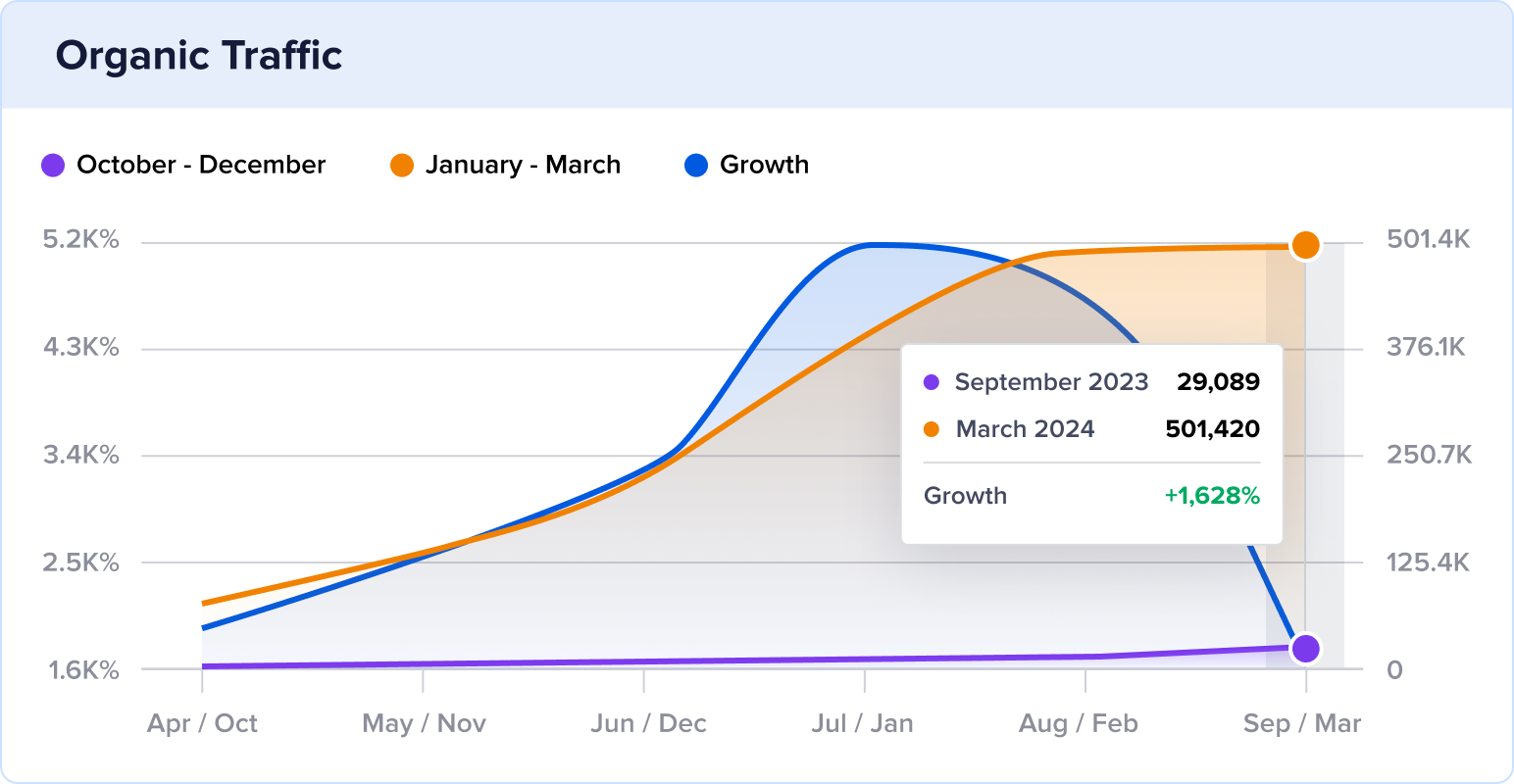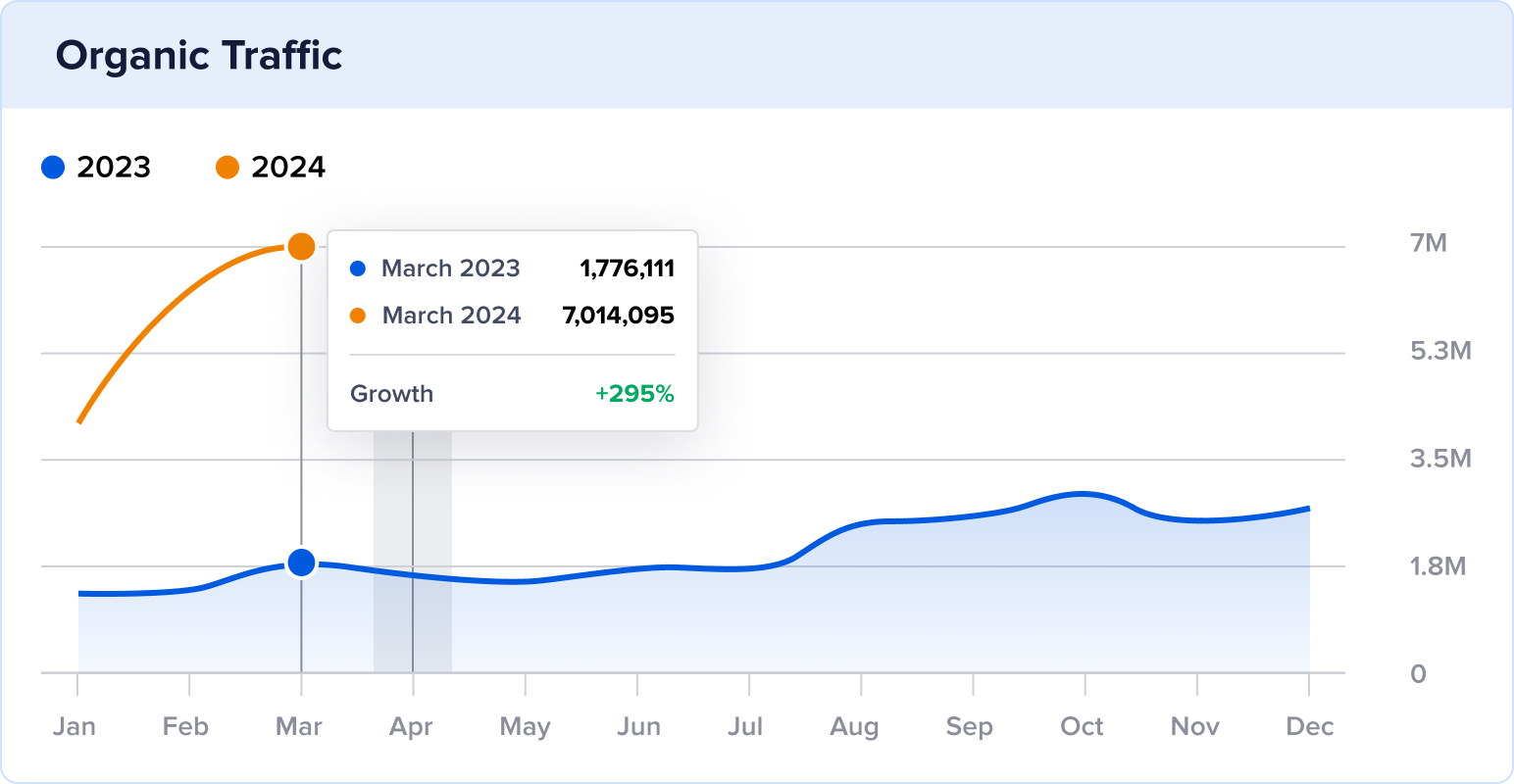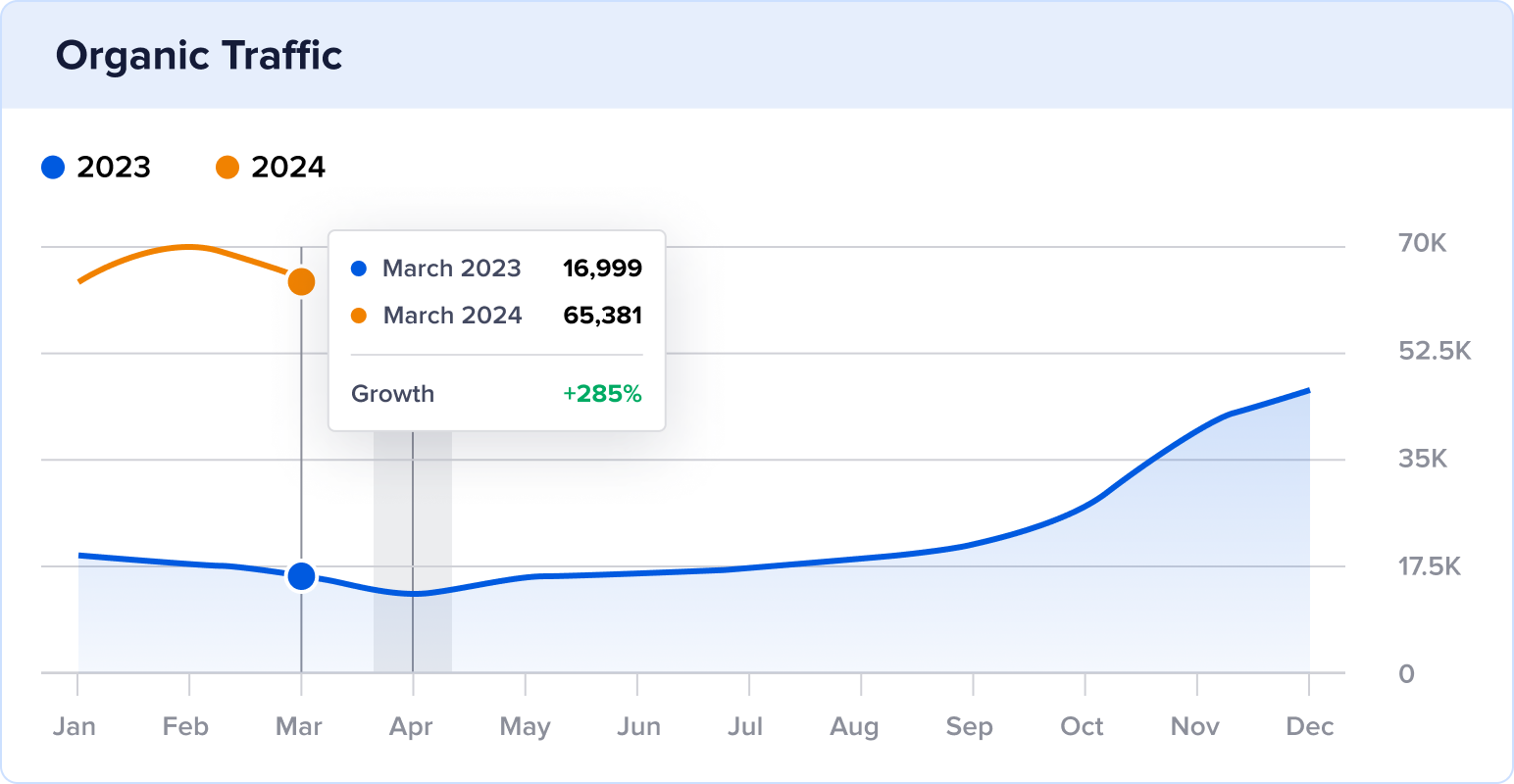How a Running Apparel Retailer Grew Traffic by 509% in 6 Months
https://www.marathonsports.com/
Stats
72.1K to 438.8K Monthly Visits
Industry
Ecommerce & Retail
Niche
Apparel
Reporting Date
January 2024
With nearly 59,700 sporting goods stores across the United States, the competition for local customers is fierce. Add in the massive revenue generated by online sporting goods eCommerce giants, and the challenge can seem daunting.
However, some local companies prove that carving out your own space in the digital realm is entirely achievable.
Meet Marathon Sports, a New England retailer of running apparel and accessories.
They recently grew organic traffic by 509% in 6 months, and we’re revealing how they did it so you can get inspired to grow your business.
Let’s get started.
In This Article
About Marathon Sports
Marathon Sports was founded in 1975 in Cambridge, Massachusetts.
It began as a one-store operation for runners, walkers, and fitness enthusiasts to get their sports gear.
Almost 50 years later, Marathon Sports has 22 locations in New England. They also have a thriving eCommerce.
Athletes can shop for running shoes, apparel, and accessories both online and in-store.
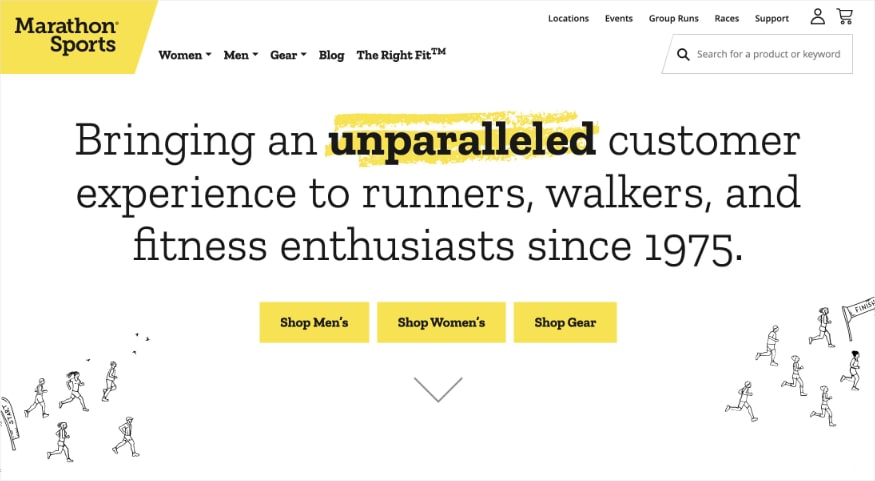
Marathon Sports is also a staple in its local running community. They organize weekly group runs and seasonal events like the Valentine’s Day run. They also share upcoming races in the New England area.
Most recently, Marathon Sports has brought back its annual Winter Warrior Challenge. Participants are encouraged to get outside and run or walk every day in January and February, earning badges and prizes along the way.
Historical Performance
According to the Wayback Machine, the Marathon Sports domain has been active since 1999.
However, we’ll focus on the last 11 years of its organic performance to understand how January 2024’s explosive growth compares.
Here’s a chart of Marathon Sports’ organic traffic during this time:
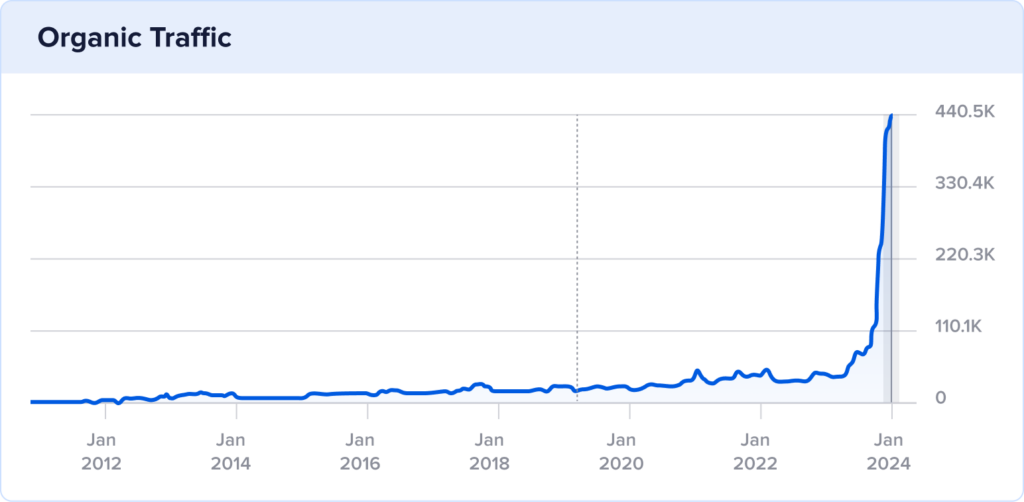
And to help comprehend the enormity of its recent growth, here’s a breakdown of monthly averages and annual totals:
| Time Period | Average Monthly Visits | Total Annual Traffic |
|---|---|---|
| 2012-2016* | 6,460 | 155,040* |
| 2017-2021* | 11,044 | 662,644* |
| 2022 | 45,626 | 547,515 |
| 2023 | 90,637 | 1,087,646 |
| January 2024 | 438,802 | N/A |
So, what happened in 2023 to allow Marathon Sports to finally cross the 1-million annual traffic mark?
And even more impressively, skyrocket January 2024’s traffic to an incredible 438.8K organic visits?
Let’s find out.
The Catalyst: How Marathon Sports Reached 438.8K Monthly Visits
Marathonsports.com grew its organic traffic by performing the following:
- Doubled down on content production
- Transitioned from subdomains to subdirectories
- Implemented product schema markup to win rich snippets
Let’s explore each strategy to see how it contributed to Marathon Sports’ newfound success.
1. Doubled Down on Content Production
Between July 2023 and January 2024, Marathon Sports doubled the amount of content on its site. They went from around 2.9K pages to 6K.
They added the following:
- New products
- New collections
- More blogs
And the effect was dramatic.
Keyword rankings started pouring in.
Here are just a few of the new keywords Marathon Sports started ranking for. Note the high search volumes (Volume column) and new traffic (Traffic.Diff column) it brought to the site.
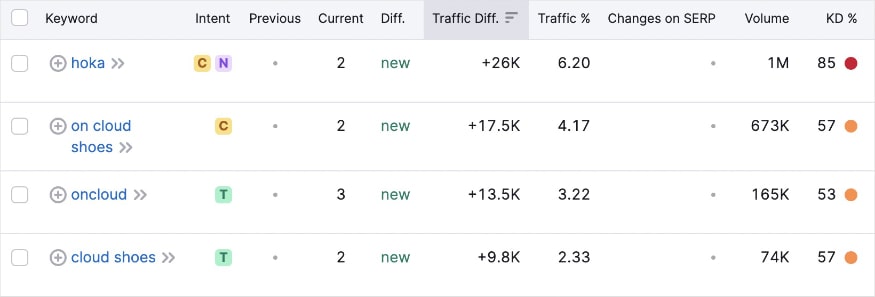
Overall, this new content contributed significantly to Marathon Sports’ keyword rankings. They shot up from 47.2 keyword rankings in July to 105.4K in January.
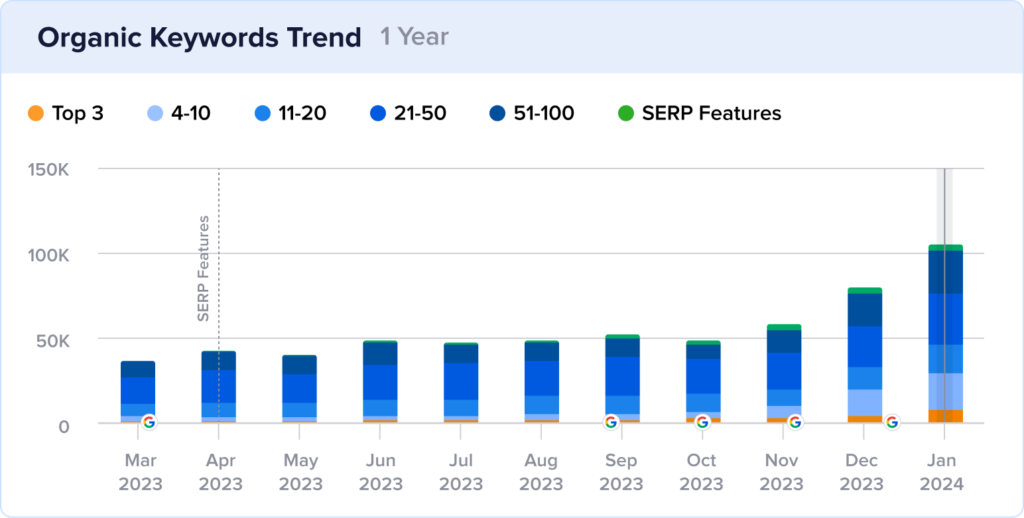
Furthermore, they were ranking higher than ever before.
Looking at the chart below, we see how Q4 of 2023 and January 2024 underwent exponential growth in ranking positions.
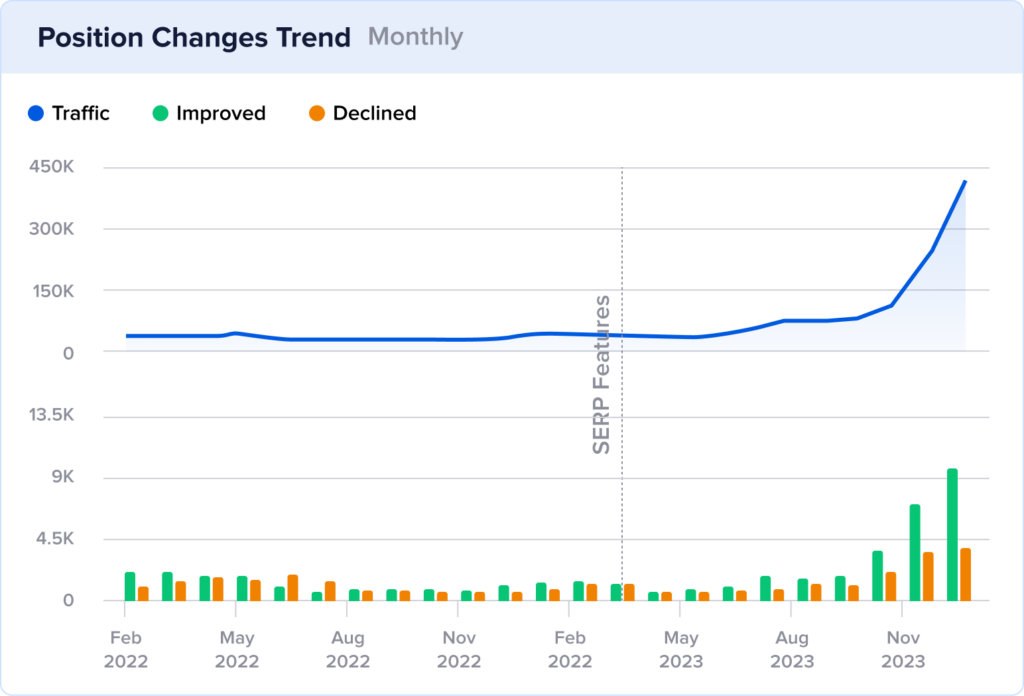
Why this matters:
It’s no secret that more content equals more keyword ranking opportunities.
And the higher up on the search engine results page (SERP) you are, the more traffic you’ll get.
After all, according to SEO ranking statistics, the top 3 organic results get 68.7% of all clicks.
That’s why it’s critical to optimize your website for maximum visibility and ranking potential.
By implementing an SEO content strategy, you can pinpoint which keywords you want to rank for, tailor your content to fulfill search intent, and, ultimately, capture a larger share of organic traffic.
How to create an SEO content strategy:
This in-depth tutorial shows you how to create an SEO content strategy that wins higher rankings.
Here’s a brief overview of the process:
- Invest in the right SEO tools.
- Get to know your target audience.
- Pick keywords aligned with your business. (For eCommerce, this would be buyer intent keywords.)
- Identify your principal content types (e.g., blogs, videos, eBooks.)
- Use topic clusters to organize your content strategy.
- Plan your on-page SEO.
- Implement processes for tracking keywords and performance analytics.
Tools for an effective SEO content strategy:
All in One SEO (AIOSEO) is the best WordPress SEO plugin on the market. It comes with a suite of tools to help you implement a winning SEO strategy without needing to know the ins and outs of SEO.
One of its most powerful tools is the TruSEO On-Page Analysis.
TruSEO streamlines content optimizations by providing real-time feedback as you create or edit your content. It analyzes key on-page SEO elements such as keyword usage, permalink structure, and readability.
You’ll get helpful checklists to ensure your content ranks well and resonates with your audience.
Here’s an example of the Focus Keyphrase Checklist:
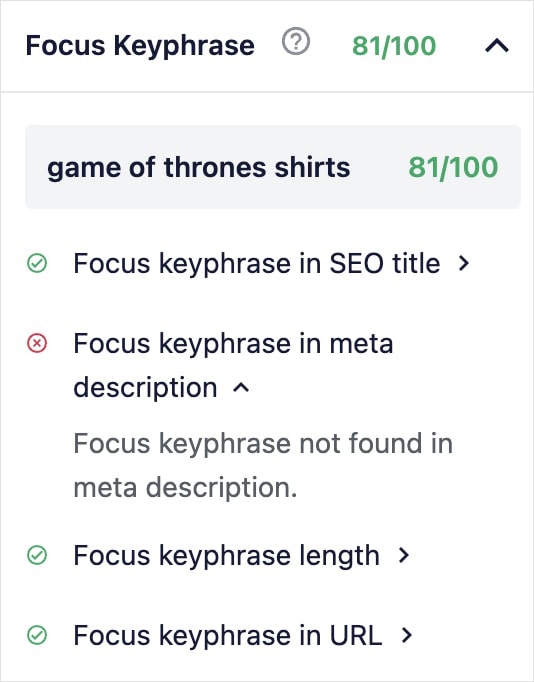
Next, let’s look at some technical changes Marathon Sports made to reorganize its site structure.
2. Transitioned From Subdomains to Subdirectories
In recent years, Marathon Sports relied on subdomains.
Subdomains are a branch of your primary domain. It’s closely tied to your primary domain but is treated as a separate entity by search engines.
Here’s an example of what a subdomain looks like in a URL:
subdomain1.primarydomain.comFor Marathon Sports, they had two subdomains in addition to its primary domain (marathonsports.com):
- shop.marathonsports.com
- Stores.marathonsports.com
The shop subdomain served as the site’s eCommerce platform. Customers could shop for and purchase their running products online.
The stores subdomain organized Marathon Sports’ retail locations. Each page included helpful store details, like hours, address, and phone number.
Come Q4 of 2023, Marathon Sports started to transition away from subdomains. Instead, they opted for new subdirectories.
Subdirectories are like folders that live within your primary domain. They’re also aptly referred to as subfolders.
Here’s what one looks like a URL:
www.primarydomain.com/subfolder1Now, here’s the thing about subdomains vs subdirectories: there isn’t a clear-cut winner of which is best for websites. It depends on your needs.
And they can both work for SEO.
Here’s Google’s Search Advocate, John Mueller’s take on the topic:
In general, subdirectories are a good option for small businesses.
That’s because subdirectories consolidate all your SEO efforts into one domain. This includes backlinks and page and domain authority.
Subdomains, on the other hand, are great when you’re running a larger business with several campaigns and unique content. They make it easy to organize and silo out business needs and traffic accordingly.
For further reading, this article does a good job of explaining the pros and cons of subdomains vs subdirectories. It can help you decide which is the best for your business.
Why this matters:
For Marathon Sports, it’s worth considering this site restructure as a contributing factor in its recent growth.
For your WordPress site, choosing the proper site structure is paramount. And even better if you can get it right the first time.
Luckily, the WordPress Multisite feature makes it easy to set up and manage all your sites from one dashboard. (We’ll give you resources on WordPress Multisite next.)
Also, if you’re like Marathon Sports and want to change your site structure, it’s important to take the right precautions to preserve your SEO performance and rankings.
How to set and change your site structure in WordPress Multisite:
This guide shows you how to create a multisite network and pick subdomains or subdirectories.
This setting cannot be changed later on.
With that said, there are ways to transfer your subdomains to your primary domain should you decide to follow the same path as Marathon Sports.
You can use this step-by-step tutorial to learn how to move WordPress subdomains to a primary domain.
Finally, regardless of which site structure you decide to use, you’ll want to implement multisite SEO. It’s not as difficult as you may think, and certain plugins can streamline the process.
Let’s look at which one we recommend next.
Tools for multisite networks:
AIOSEO was designed with multisite networks in mind.
Here are some of the top ways you can save time while optimizing your multisite network with AIOSEO:
- Activate your AIOSEO license across your entire network with 1 click.
- Import and export SEO settings from one site to another.
- Edit and manage Robots.txt files to control how search engines crawl your sites.
We’d also like to highlight the Redirection Manager tool.
Redirection Manager allows you to easily set up individual and full site redirects. That way, if you ever need to change URL structures, you’ll safeguard any hard-earned rankings.
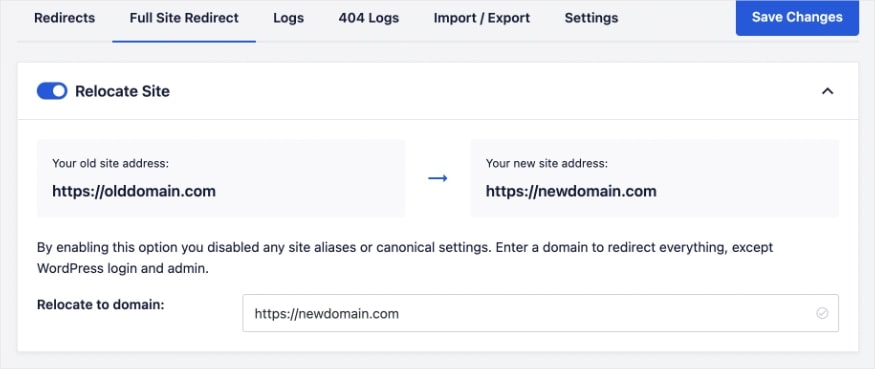
Next, we’re going to look at what optimizations Marathon Sports made to get more attractive search results on the SERP.
3. Implemented Product Schema Markup to Win Rich Snippets
Marathon Sports uses product schema markup on the backend of its website.
Product schema is a type of schema markup that helps search engines understand your content. It lives in your website’s code and communicates important details about your page to search engines.
In turn, search engines can use this information to generate a rich snippet on the SERP.
Rich snippets display more information than standard search results. This helps them stand out to users and get more clicks.
Here’s an example of one:
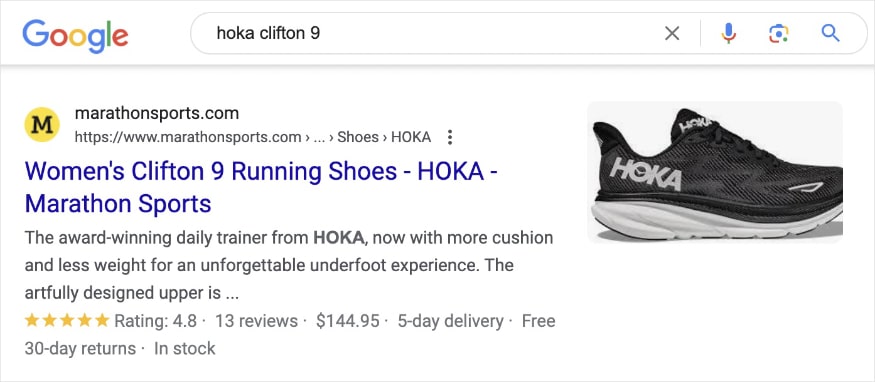
See how much space that takes up in search results?
It has a lot of eye-catching details, like the photo, star ratings, and additional product information.
At the end of 2023 and the start of 2024, Marathon Sports won a lot of these rich results.
Rich snippets with images were their most popular. They ranked for 51K keywords with image rich results in January.
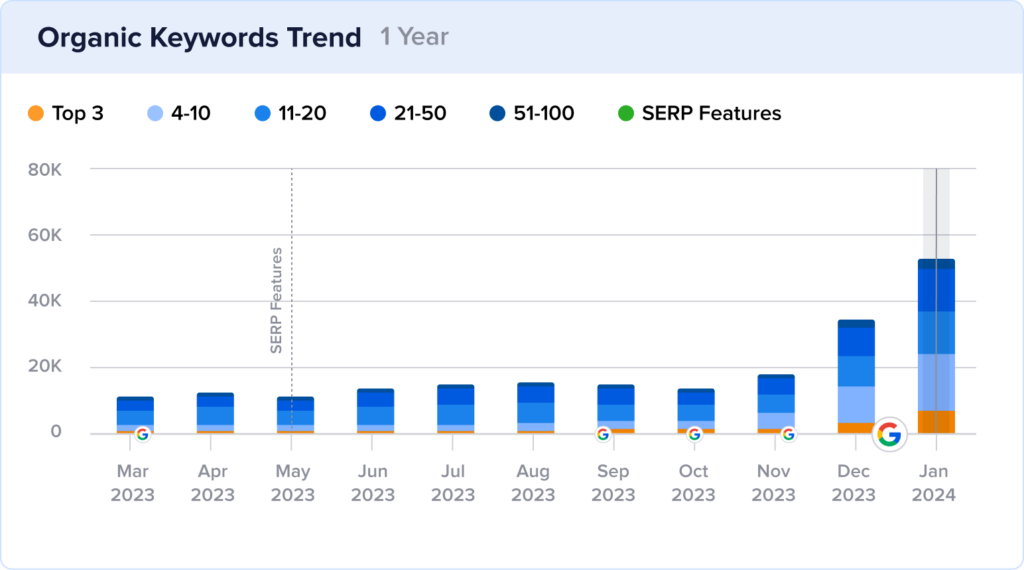
Review snippets were their second most popular, with 15.3K ranking keywords.
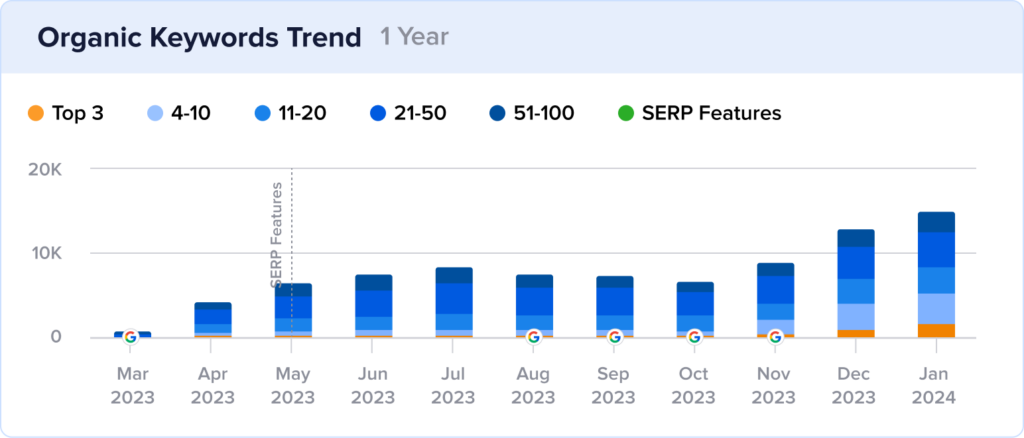
Why this matters:
Rich snippets get the lion’s share of clicks, boasting a 58% clickthrough rate (CTR.)
Non-rich results have a CTR of 41%.
That’s why it’s critical to optimize your site for these attention-grabbing search results.
Now, let’s look at how to get them.
How to implement schema markup for rich snippets:
This guide demonstrates three methods for adding schema markup to WordPress without a plugin.
Each uses JSON-LD and requires some coding knowledge.
If you run an eCommerce, you should also check out Google’s guidelines for implementing product structured data.
Tools for rich snippet schema:
Hate the idea of touching code?
You’re not alone.
A lot of website owners don’t feel comfortable implementing their own schema markup. The good news is that you don’t have to.
Schema generator plugins are the easiest way to add schema markup to your WordPress site.
And you don’t need any coding knowledge to use them.
AIOSEO’s Schema Generator automatically formats structured data for you. All you have to do is pick the schema type you want.
The Schema Catalog comes with several different schema markups, including product. Just click the + button, fill out a few informational fields, and that’s it!
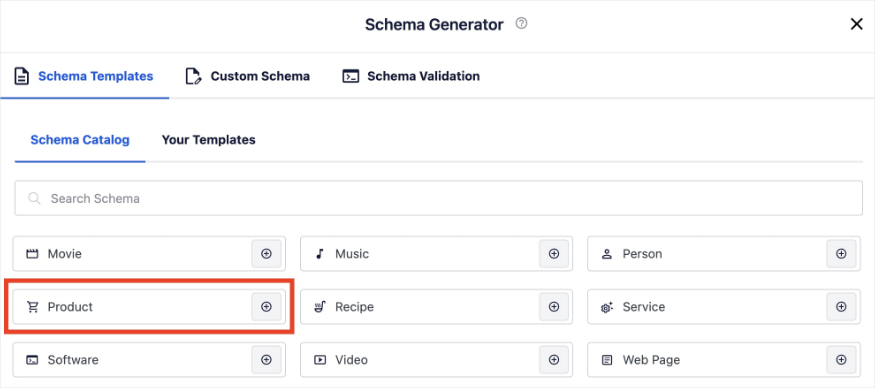
Standout SEO Wins
Before we wrap up, there’s an additional SEO technique worth highlighting at Marathon Sports.
1. They optimize blogs for Google’s People Also Ask box.
Google’s People Also Ask (PAA) box appears prominently on the SERP and aims to answer related questions to the original search.
It has an accordion-like appearance that can be expanded to reveal the answer, as shown below.
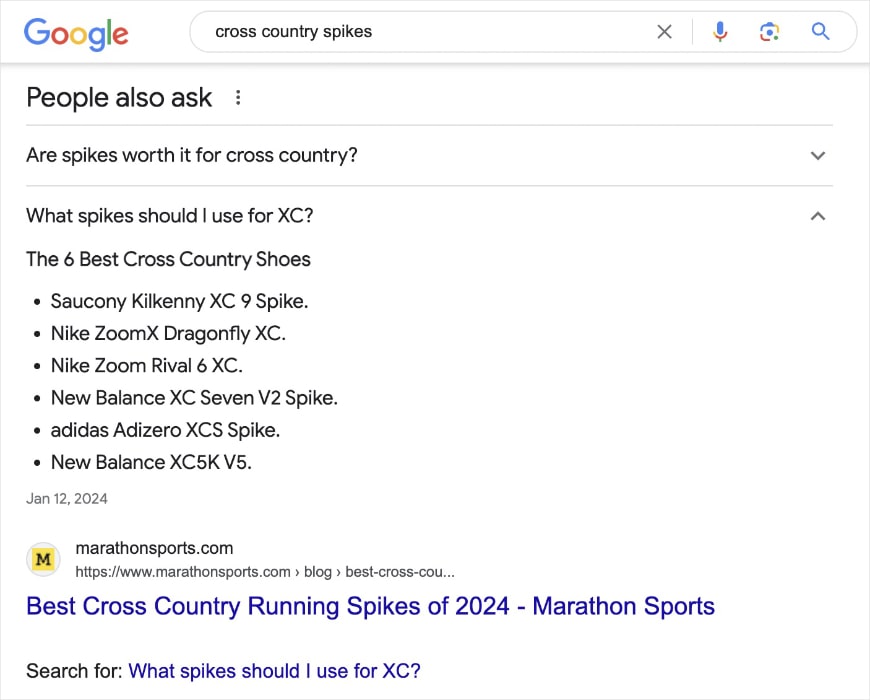
Marathon Sports optimizes its blogs to win PAA results by doing the following:
- Crafting high-quality content that fulfills search intent.
- Implementing schema markup. (Although, we would like to see FAQ schema, which they do not appear to use.
- Optimizing subheadings to include keywords and questions.
And while it hasn’t been a huge traffic generator yet (PAA results account for 4.4% of January’s total traffic), we wouldn’t be surprised to see it take off in future months.
Ultimately, Google’s PAA box is covetable SERP real estate, and every site should aim to be included in it. These results can boost brand awareness, enhance credibility, and increase CTR.
Tool: FAQs are an integral part of winning PAA results. You can effortlessly add FAQ blocks to your content with the help of AIOSEO. These blocks make it easy to write your question and answer, then implement FAQ schema automatically for you.
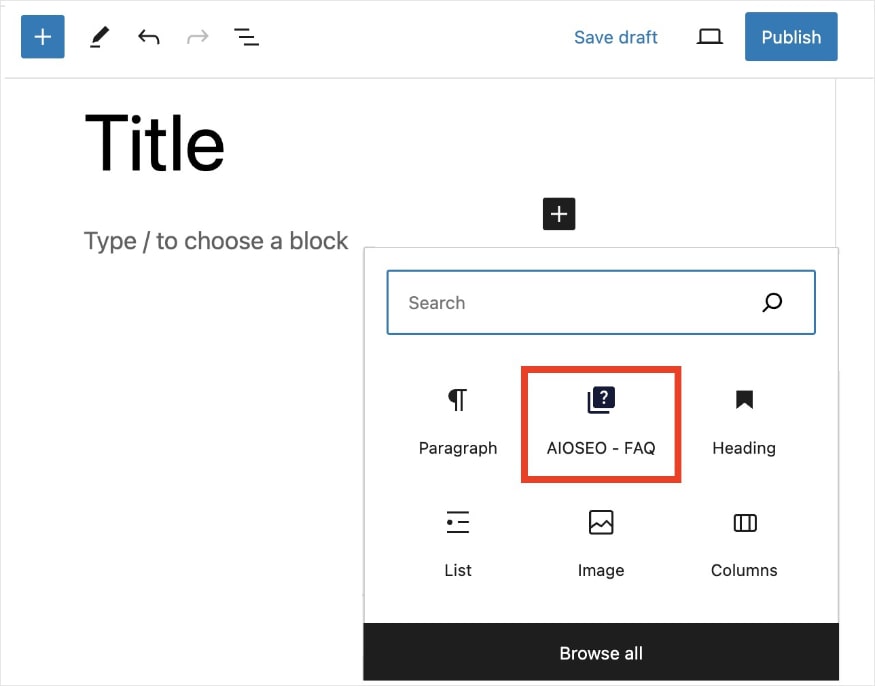
Takeaways
In our analysis of marathonsports.com, we’ve discovered how new content and some strategic technical optimizations catapulted organic traffic to new heights.
Now, let’s recap which strategies you can use on your website and others to reconsider.
Top 3 Strategies to Emulate
- Create more content. Expanding your website’s content offers a multitude of benefits for SEO. By regularly publishing relevant, high-quality content, you keep users engaged and build authority. It also helps you rank for a broader range of keywords and presents more internal linking opportunities.
- Choose the right site structure. Selecting an organized and intuitive site structure is beneficial for users and search engines. A clear and logical hierarchy makes it easier for visitors to navigate your site. It also helps search engines crawl and index your pages efficiently. Consider factors such as categorization and internal linking when selecting your site structure to ensure it aligns with a positive user experience and SEO best practices.
- Use schema markup to win rich snippets. While implementing schema markup doesn’t guarantee a rich result, it increases the likelihood. Schema markup makes it easier for search engines to understand your content. And the easier it can understand your pages, the better chances it has of ranking. Schema markup can then help you get an eye-catching search result that earns more clicks than non-rich results.
Bottom 3 Strategies to Reconsider
- Blogs show authors, but no author bios. While showcasing authors can add credibility to your blog posts, omitting bios can leave visitors wondering about the expertise and background of the writers. Author bios establish trust with readers and can help build authority for search engines. They’re a great way to practice transparency and send positive Google E-E-A-T signals. Plus, with tools like AIOSEO’s Author SEO, they’re super easy to set up and implement.
- Several pages are missing meta descriptions. Meta descriptions play a crucial role in attracting clicks from the SERP. They act like previews of your content, compelling users to visit your site. Pages without meta descriptions appear incomplete and less informative than those with them. Because of this, you’ll want to ensure a unique meta description for every indexable page. You can even use a meta description generator to write them for you.
- Some pages are flagged for being difficult to read. Content readability measures how easily users can read and understand your content. Users will lose interest when it’s too difficult, and your page can experience high bounce rates. To improve your readability score, opt for simple language and short sentences. You can also break up blocks of text with headings, bullet points, and multimedia. The TruSEO tool checks readability for you and gives you actionable insights to fix it.
Steal Our Winning SEO Strategy: A Checklist for Your Website
Are you ready to grow your eCommerce business and win more sales?
SEO is the key to getting your site in front of more online customers, and with this exclusive checklist, you’ll have the steps to make your optimizations a homerun.
Download A Free SEO Checklist
Access our comprehensive SEO Checklist with a single click. We’ll deliver it straight to you, putting actionable items with SEO tools and tutorials right at your fingertips.
Enter your name and email to download a free SEO checklist.
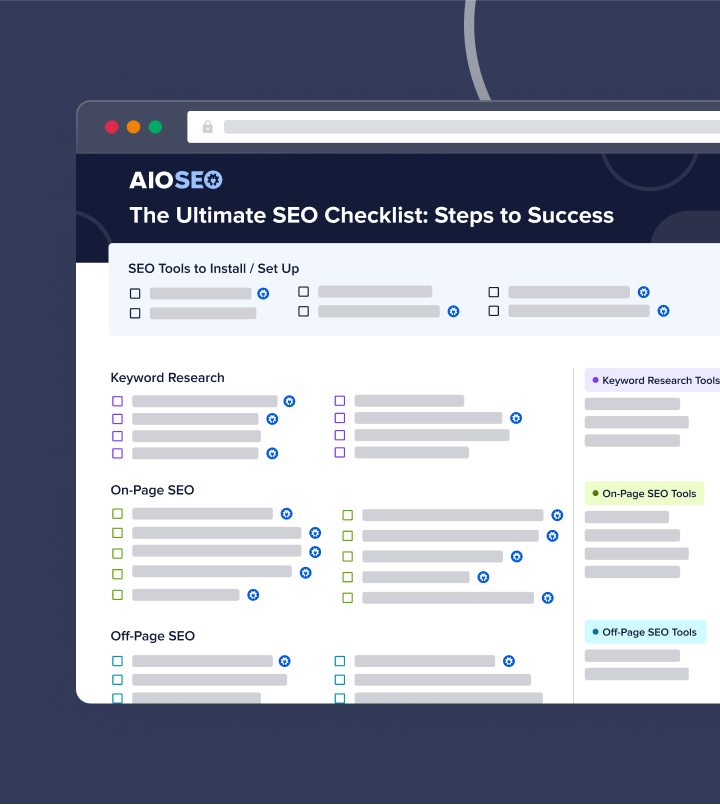
Boost Your Visibility and Organic Traffic With AIOSEO
What if you could skip past the SEO learning curve and jump straight to higher rankings and more traffic?
AIOSEO can help you do just that.
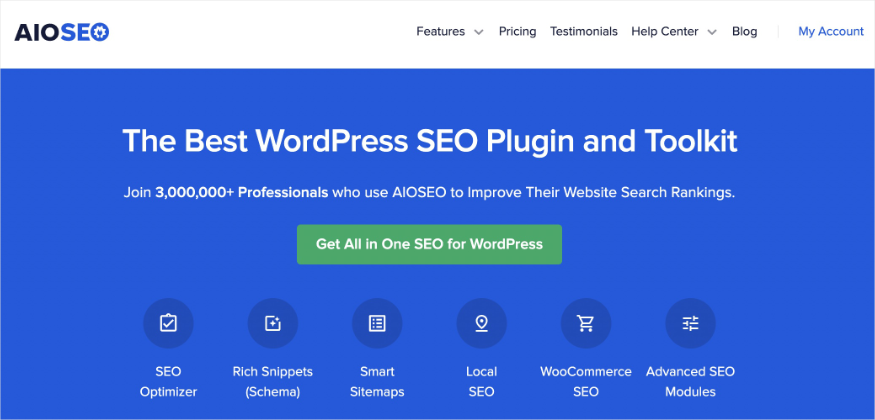
With thousands of 5-star reviews and trusted by over 3 million website owners, AIOSEO offers an all-inclusive toolkit to enhance your website’s visibility effortlessly. And the best part? It’s incredibly user-friendly. We believe SEO shouldn’t be limited to experts. Explore some of our favorite features below, all designed to help you grow your business.
- TruSEO Score: Get a snapshot view, or go into detail, of your content’s on-page SEO with this innovative tool. TruSEO analyzes your content optimizations and gives you actionable insights to maximize its reach.
- Robots.txt Editor: Control how bots crawl your site with the Robots.txt Editor, which allows you to override default WordPress settings. This tool also makes it simple to manage rules across a multisite network.
- Redirection Manager: Prevent humans and bots from getting lost when you move content or domains. Our Redirection Manager helps you easily choose and implement the best redirect type that preserves SEO.
- Rich Snippet Schema: Choose from various schema markups to claim more rich results on the SERP. It’s as simple as choosing the schema you want; then, we’ll format the structured data for Google.
- FAQ Blocks: Add FAQs to your content to increase the likelihood of appearing in Google’s People Also Ask box. These results help boost brand awareness and increase clickthrough rates.
- Author SEO: Create powerful author bios that showcase your experience and expertise. This addon aligns your content with Google E-E-A-T guidelines and helps readers trust what you’re sharing.

